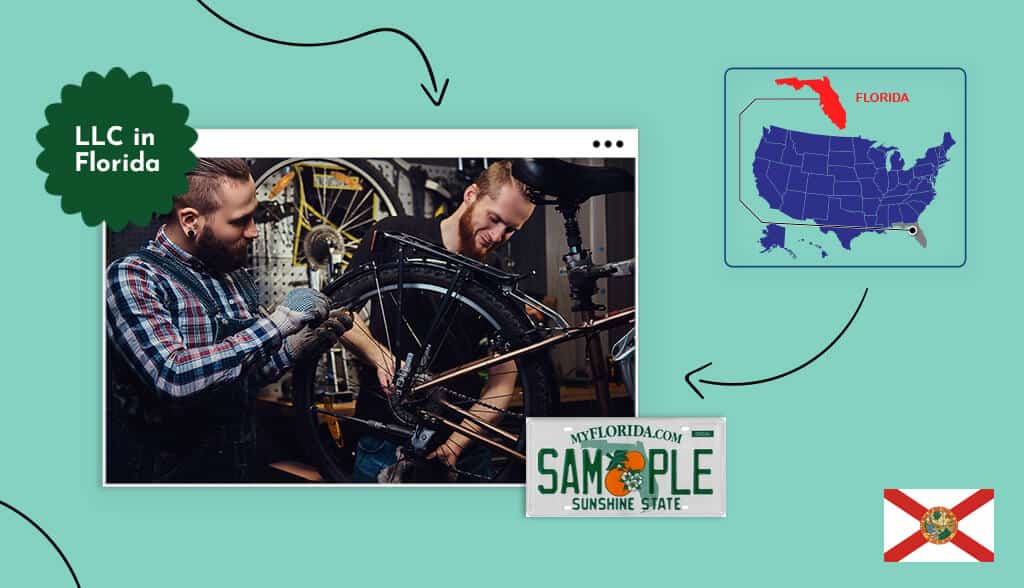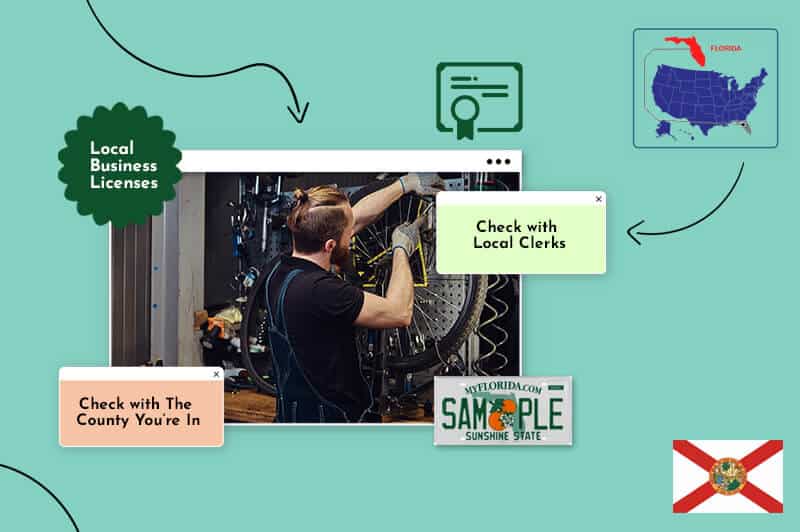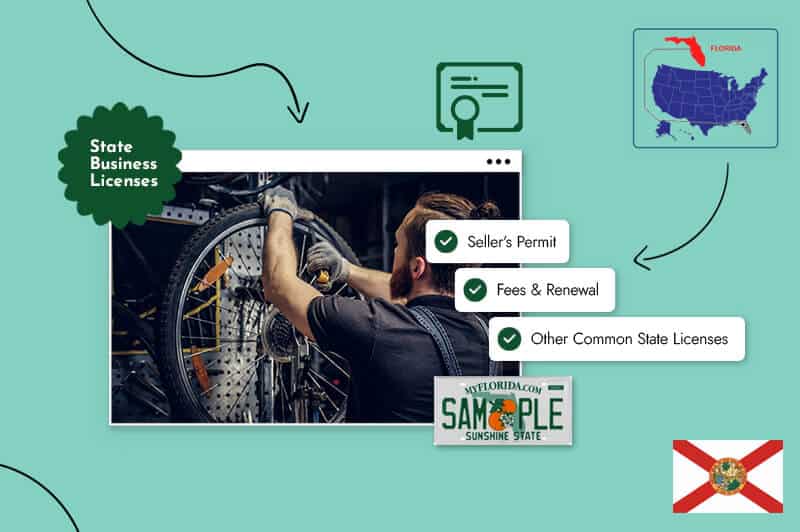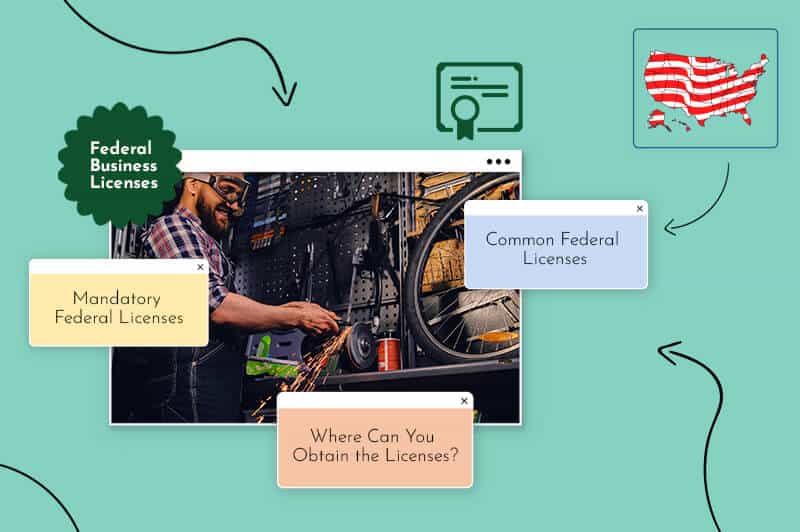
Start a Small Business → Start a Business in Florida → Get a Small Business License in Florida
After starting your business in Florida, you will want to ensure you get all the licenses and permits you need and meet all other requirements to operate in the state.
Florida does not require a statewide business license. However, certain professionals need a statewide license. All Florida county and local governments require a business to be licensed to operate in their jurisdictions.
Government regulations at the state, county, and local levels may require an LLC to have a business license and permits to do business within the area of their jurisdiction.
Permits are different from licenses. Permits focus on enforcing zoning and safety rules. Licenses give you permission to do or use something.
For example, you might need a license to be a hairstylist and a permit to operate a hair salon.
Depending on what you intend to do, you might need specific county or city business licenses. This general county or city business license is a Florida business tax receipt. Any business selling products or services to the public must have one, including home-based businesses.
The Florida business tax receipt is proof of payment. Display it publicly at your business. It is subject to inspection by a county or municipal official, depending on the company’s location.
You may need the appropriate permits and a zoning clearance to operate your LLC in Florida for your physical locations. City and county governments have regulations that you must follow to operate within their jurisdictions. They issue permits to go along with any licensing requirements.
Here are examples of the types of permits you may need:
Your business may require a statewide license(s) to conduct business in Florida obtained from the Department of Agriculture and Consumer Services.
Your profession may require a statewide license(s) to conduct business in Florida obtained from the Department of Business & Professional Regulation.
You may need a license or permit from the Department of Health or any of the other statewide licensing agencies.
You may also need county and municipal licenses and permits. If your business requires a federal license or permit to operate, you must get those.
Start with searching for the information found on the “Open My Florida Business” website. You will find what you need to know about statewide licenses and links to the Florida counties’ home pages to review the requirements for operating a business in each county.
Next, you will want to check with the municipalities where you plan to operate the business of the LLC to find out about the local requirements for licenses and permits.
Finally, for federal licenses and permits, check the list published by the Small Business Administration to see if any of your business activities require a federal license or permit.
Operating an unlicensed business in Florida is a first-degree misdemeanor. This crime is punishable by up to one year in jail and a fine of up to $1,000.

The most common business license needed in Florida is a business operating license, also called a “business tax receipt.”
If you operate your business using a different name than the name you registered for your LLC, you need a Doing Business As (DBA) registration.
There are 67 counties in the state of Florida. Each has its own regulations and ordinances to be followed when operating a business.
Open My Florida Business has a database with links to all the county’s web pages so that business owners may become familiar with the regulations of a county where they plan to conduct business using their Florida LLC.
Find out which regulatory entity has jurisdiction over the location where you plan to operate by contacting city hall or the county administration.
For example, if you plan to operate in Miami, you will be in Miami-Dade County’s jurisdiction, including 34 cities, towns, villages, incorporated municipalities, and unincorporated areas.
Here are some local permits you may need to operate your LLC.
Zoning regulations determine if your LLC can operate in a certain area. The exact location you plan to use must have the zoning needed for the purpose you want.
Getting a zoning permit may be challenging. These permits cover rules about many things such as signs, building appearance, noise, and garbage disposal.
If you attempt to operate without the proper zoning permit, your business may have to stop, and you might be subject to fines or criminal prosecution.
If you plan to do anything with food at your business location, you will need a health permit. This type of permit includes storage, shipping, preparation, and serving of food. You will be subject to frequent health inspections to ensure your business meets hygienic standards.
If you plan to renovate the building or make any structural changes, you will need to get a building permit. The type of permit depends on the plans you have.
You may face the need for an Environmental Impact Report to get an environmental permit if your business has any potential to negatively affect the area in regards to water or air quality and waste.

You may need more than one type of Florida statewide license to operate your LLC’s business. If you are unsure what licenses you may need, conduct additional research using the Sunbiz website.
Any business in Florida that sells or leases tangible property must obtain a seller’s permit, also called a Florida Annual Resale Certificate. You can sell things in-store or online and collect sales taxes when selling taxable items with this permit. You may also avoid paying sales taxes on items purchased for resale.
To get this tax permit, submit a business tax application to the Florida Department of Revenue or make your tax registration application online.
There is no fee for registering online for a Florida seller’s permit; however, there is a $5 processing fee if applying by mail.
Every business in Florida must fill out a Florida Business Tax Form and submit it or register the company online.
The Florida Department of Business & Professional Regulation (DBPR) provides licenses for various professions.
Examples of professions that need a license include:
The Florida Department of Agriculture and Consumer Services (DACS) provides licenses for certain types of operations, such as:
This list is just a partial list, so check with DACS to understand if your operations need a license.
The Florida Department of Health (FDOH) provides licenses to protect the public safety of Florida residents and visitors.
Suppose your LLC’s operations relate to public health, including medical professionals, therapists, dietitians, nurses, tattoo artists, and similar industries. In that case, you must license your LLC with the Florida Department of Health.
There are other licensing agencies for foster care, group homes, daycare, and insurance agents.
You should check with the State Agency homepages for the types of businesses or facilities you will operate or your activities.
For businesses regulated by Florida, you must also have a local business tax receipt for each place of business. You also need a local business tax receipt for each separate business according to its tax classification, and you operate from the same physical location.

Most small businesses in Florida do not need any federal licenses or permits.
Depending on what you plan to do, you may need to obtain a federal license.
Here are a few types of businesses that need federal business licenses:
The Small Business Administration (SBA) has a database that gives information about all the requirements for federal- and state-licensed businesses.
For professional licenses, you may need your identification, social security number, fingerprints, and proof of specific qualifications. These requirements depend on the type of license.
Here is what you may need for business licenses:
Once you figure out the licenses and permits you need, you can register with the appropriate agency for statewide licenses, county licenses and permits, local licenses and permits in the cities you operate, and federal licenses and permits for those businesses that require them.
New Jersey does not charge a fee for the vendor’s license. The license does not expire; thus, it cannot be renewed.
This portion of our website is for informational or educational purposes only. Tailor Brands is not a law firm, and the information on this website does not constitute legal advice. All statements, opinions, recommendations, and conclusions are solely the expression of the author and provided on an as-is basis. Accordingly, Tailor Brands is not responsible for the information and/or its accuracy or completeness. It also does not indicate any affiliation between Tailor Brands and any other brands, services or logos on this page.
Products
Resources
©2025 Copyright Tailor Brands